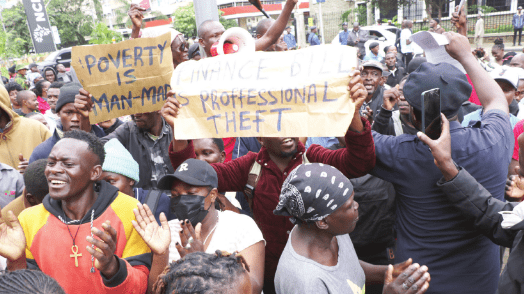Kenyans tell Parliament to reject ‘punitive’ Finance Bill
By Mercy.Mwai, June 10, 2024In a major test for Parliament, an overwhelming majority of Kenyans have rejected the controversial Finance Bill 2024.
Some 108 of 120 stakeholders in the manufacturing, telecommunication, edible oil, banking and digital sectors have opposed several proposals in the bill now being scrutinised by the National Assembly’s Finance and National Planning Committee. The stakeholders argued that it will not only lead to job losses but is also bad for Kenyans.
The committee, which will hold a public hearing on the bill today, has received over 600 memoranda that MPs must review before they meet the National Treasury and top government officials to respond to the issues raised by the stakeholders.
The law requires Parliament to pass the Finance Bill and the document be signed into law by the President by June 30, paving the way for enforcement of revenue-raising measures, including new taxes, starting on July 1, when the financial year begins.
Reservations
The public hearing will be held at the Kenyatta International Convention Centre today, 10th June, between 9.30am and 5pm, said a notice from National Assembly Clerk Samuel Njoroge.
The public and stakeholders are invited to submit “their oral representation and written memoranda on the Bill to the Departmental Committee on Finance and National Planning during the said public hearing.”
Among the stakeholders that have expressed their reservations on the bill are the Kenya Private Sector Alliance (Kepsa), Kenya Bankers Association, Safaricom, American Chamber Of Commerce, Kenya Women Parliamentary Association, Kenya Tea Growers, and Uber Kenya,
In its memorandum to the committee, Kepsa cited several proposals, including a motor vehicle tax that it wants removed from the Income Tax Act and a levy under the Miscellaneous Fees and Levies Act to be charged on petroleum at a rate of Sh1 per litre to be introduced.
Kepsa, which has suggested that commercial and agricultural vehicles be exempted from the tax, also wants the proposed rate reduced to one percent of the value of the motor vehicle and have it capped at Sh20,000.
Said Kepsa: “Subjecting commercial and agricultural vehicles to the Motor Vehicle Tax will increase the operating costs of manufacturers and their suppliers who utilise vehicles for commercial (logistics) and agricultural (planting, harvesting, logistics) purposes and the cost of food items.
“These additional operational costs will make businesses less profitable and result in higher prices for consumers.”
Insurance
The association added that the new tax will “adversely affect the insurance business as many vehicles and especially motorcycles will operate without insurance policies”.
On the amendment of Section 31 of CAP 470, which proposes to delete the words “or a contribution made to the National Hospital Insurance Fund”, Kepsa says he proposed deletion will repeal relief for all health policies, including private ones.
On Value Added Tax, where the bill proposes that the standard rate for locally manufactured or assembled phones be removed under the zero-rated category, Kepsa wants the zero-rated status reinstated. The association argued that imposing VAT will not only drive up the cost of doing business but also affect the affordability of locally assembled phones and hence hinder their market penetration.
Said Kepasa: “Since there has yet to be additional suppliers entering the market other than EADAK (East Africa Device Assembly Kenya), the zero-rated status should be maintained to encourage investment and affordability of the devices.”
On the proposal to remove the exemption of gluten and leavened bread from VAT, Kepsa wants the exemptions retained on the grounds that the tax will raise the cost of the two types of bread by Sh10 and Sh12.5 respectively.
On increasing excise duty on fees charged for money transfers by cellular providers from 15 percent to 20 percent, Kepsa said this will erode the gains made on financial inclusion and open doors to black-market money transfer options, which contradicts the government’s objective for expanding the tax net.
They also want all pest control products used in public health (including for mosquito control, bedbugs and rodents) zero-rated in order to support affordable healthcare through preventive quality services and prevent transmission of diseases from animals to humans.
